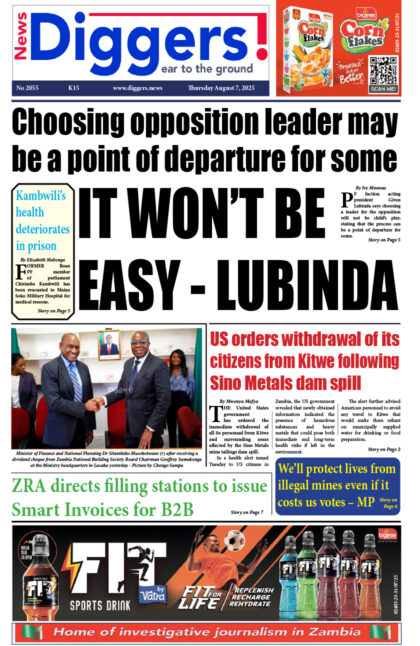Two months ago, the Ethiopian government passed a resolution to partially privatize the country’s giant state-owned enterprises, including the 100 percent publicly owned national flag carrier, Ethiopian Airlines.
We reported this news with a thought that this was going to have a huge impact on the Zambian government’s decision to establish a national airline, considering that 45 per cent of this airline is to be owned by Ethiopian Airlines.
Strangely, our government doesn’t seem moved by the developments in Addis Ababa. We have also reported concerns from economists and aviation industry experts who have advised that this decision may end up as a drain on public resources, especially that the top benefactor of this establishment will be government departments who don’t pay for services on time.
Despite all these warnings from public stakeholders, our government doesn’t seem to be moved. In the next two months, Zambia Airways will be taking to the skies. We thought it would be an appropriate time to remind our readers about what we said over the Zambia Airways deal; putting into consideration concerns from stake holders.
Much as we would like to close our ears and hear nothing more from the Michael Sata wannabe, it is difficult to run away from the dust that Mr Chishimba Kambwili is raising. Mr Kambwili is questioning the motive behind the reestablishment of a national airline. He is concerned that the move will benefit a few corrupt hands that will be involved in the procurement process.
“What we said when Mr Sata was alive is that ‘let’s find a flag carrier to run the whole thing and retain shares’. They can bring the aeroplanes and paint them in Zambian colours as a flag carrier, but creating a national airline will be a loss-making venture under the current circumstances… The reason government is buying jets is because some people want to get commissions in the procurement process. Otherwise, it is unwise for the government to be thinking about creating a national airline when airlines such as British Airways and South African Airways, with bigger economies are struggling,” said Kambwili.
Indeed, at the time, the challenges that face South African Airways are the same that face almost any state owned airline in poorer countries with a more populist economic bent. Whenever governments own airlines, the temptation to step in and overrule potentially unpopular but necessary business decisions is simply too great.
So therefore, Mr Kambwili was right to ask what the motive is behind the establishment of a national airline under such harsh economic times. What business opportunities are we seeing as a country that other airlines in the region are failing to tap? Which particular profit-making routes are we targeting to fly that others haven’t explored, and what unique incentives are we planning to offer passengers in order for them to chose Zambia Airways?
There are so many unanswered questions around this move and it raises a lot of speculations. Who is government working with on this deal? Which businessmen are these who want to partner with government in bringing back the national airline, regardless of the investment risks involved?
We ask this because on July 22, 2017, there was a news report from Russia indicating that that country’s Sukhoi Civil Aircraft company had concluded a contract with Zambian carriers to deliver four Superjet 100-passenger planes to Zambia, including one VIP version for the President. A plane for the President was purchased, but the Minister in charge expressed ignorance and the whole development was left hash-hash.
On Zambia Airways, government technocrats may argue with us that they have everything all figured out and that there is nothing to worry; but we still have the right to demand transparency. It is very important for those in government to be thoroughly transparent when making these agreements with the private sector because darkroom deals always pave way for clever hands to swindle the government and leave the country bleeding. We don’t want to wake up tomorrow and hear that the President has bought another plane for himself without any clear record of how much taxpayers’ money was spent.
So, let those from the private sector who are interested in this aviation business be named, let us know their terms and conditions. Most importantly, let us record what they own now so that we can compare with what they will have gained after this business collapses again.
We are at pains to appreciate why Zambia needs a national carrier when the country is struggling to keep the locomotive industry afloat. Millions of Euro bond money have been pumped into the railway business, but what is there to point at as a milestone achievement in the sector? Nothing! But we still want to introduce a national carrier so that those in senior government positions and their families can abuse it.
Anyway, the criminality in this government has ceased to surprise. We are merely witnessing a looting competition. In fact, we might as well suggest to those who are bringing back the national airline to inscribe on our aircrafts the slogan: “Zambia Airways: Taking Corruption to the Air”.
























